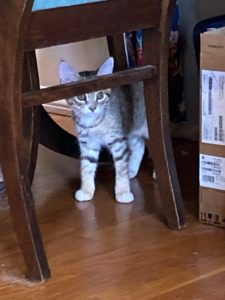 Some cats seem born to be an only cat. Others thrive with other cats around. In our household, I don’t recall ever having an only cat for more than a few weeks, until now. Olivia is an only cat. Some say that when you have a calico, you have more than one cat—there are several purr-sonalities inside a tri-colored cat.
Some cats seem born to be an only cat. Others thrive with other cats around. In our household, I don’t recall ever having an only cat for more than a few weeks, until now. Olivia is an only cat. Some say that when you have a calico, you have more than one cat—there are several purr-sonalities inside a tri-colored cat.
Olivia is, for the first time, an only cat. She was trapped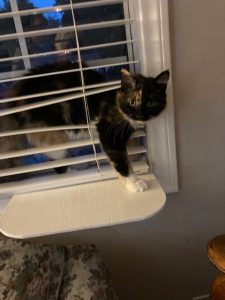 as a kitten with her siblings, lived in a shelter with other cats until she was almost three months old, then she came to live with us and our tortie Sophie. Sophie crossed over the rainbow bridge a week from her 18th birthday in July, and Olivia is now an only cat. I wonder sometimes if she’s lonely.
as a kitten with her siblings, lived in a shelter with other cats until she was almost three months old, then she came to live with us and our tortie Sophie. Sophie crossed over the rainbow bridge a week from her 18th birthday in July, and Olivia is now an only cat. I wonder sometimes if she’s lonely.
 We’ve been watching her closely to see if she seems to need another cat presence here in the house. What we’ve noticed is that Olivia is bonding more closely with both of us, but she also continues to seek solitude now and then. Is this Olivia just wanting to chill or is she lonely?
We’ve been watching her closely to see if she seems to need another cat presence here in the house. What we’ve noticed is that Olivia is bonding more closely with both of us, but she also continues to seek solitude now and then. Is this Olivia just wanting to chill or is she lonely?
I’ve been particularly concerned when we’ve gone away 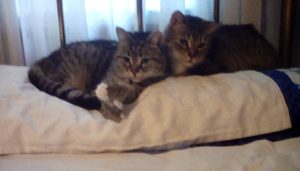 for any length of time—for the day, even. For the most part both of us are home. The first time we left Olivia overnight was when we took a ten day trip. Sophie was still
for any length of time—for the day, even. For the most part both of us are home. The first time we left Olivia overnight was when we took a ten day trip. Sophie was still 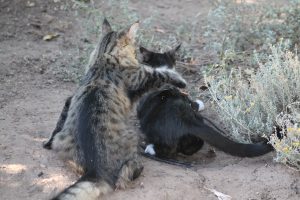 here at the time. I really fretted over that decision, and made every effort to accommodate the cats. I ended up hiring two friends to come in and feed, etc, but to also spend time with the cats. One came every morning for an hour or so and the other came in the afternoon for a couple of hours. The results were good. These ladies
here at the time. I really fretted over that decision, and made every effort to accommodate the cats. I ended up hiring two friends to come in and feed, etc, but to also spend time with the cats. One came every morning for an hour or so and the other came in the afternoon for a couple of hours. The results were good. These ladies 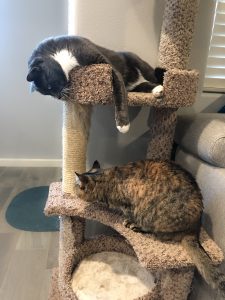 helped to socialize Olivia, but when we got home, I had the pleasure of extra, super-duper kitty-cat affection. It was obvious that Olivia missed us.
helped to socialize Olivia, but when we got home, I had the pleasure of extra, super-duper kitty-cat affection. It was obvious that Olivia missed us.
Recently we took another trip—it had been planned for over a year. This time we’d be gone four days and this time Olivia would be alone. We called on the same two ladies to check on her and entertain her and it appears everything went swimmingly.
 A few days after we returned I came across an article about cats and loneliness. This writer says that cats can experience anxiety and loneliness, which I think most of us with cats know. And there are signs that a cat is experiencing this in excess: over-grooming, not using the litter box, excessive meowing, and maybe aggressive and destructive behavior.
A few days after we returned I came across an article about cats and loneliness. This writer says that cats can experience anxiety and loneliness, which I think most of us with cats know. And there are signs that a cat is experiencing this in excess: over-grooming, not using the litter box, excessive meowing, and maybe aggressive and destructive behavior.
This writer suggests that if your cat seems to be acting out since you’ve gone back to work or if you’re suddenly going to be gone a lot, hire someone to come in and spend time playing with the cat and/or adopt a second cat. We continue to observe Olivia and so far are convinced that she is okay as things are. So we are not considering adopting again. I’d rather spend one-on-one time with Olivia depending our bond with her.





